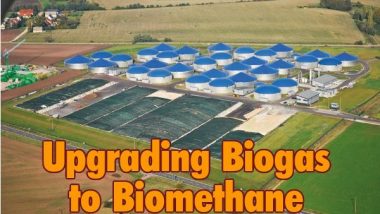There are at least 6 ways to gain Anaerobic Digestion finance, for your biogas plant project, as described below. If you want to learn the basics of how to get AD Plant finance, this is the video to watch and the article to read.
Financing for these projects is of course similar to other renewable energy projects, except for the availability of government support.
How to Finance Anaerobic Digestion Projects
Read this article carefully and inwardly digest the contents, and even if you are new to AD Plant project design and finance you should gain sufficient confidence to contact renewable energy finance companies.
Start talking to them about funding options to finance your renewable energy project as part of your business once you have worked up your business plan for the project.
Watch our video, learn from it, and we think you should be able to talk intelligently to renewable energy asset finance experts. Experts who can offer you green energy finance. That's surely all most people need to do before tackling this, the next step to making any commercial scale renewable energy project a reality.
If you've got together a design concept, a decent business plan, and have a site, and a well thought0out submission overall it's time!
Time for the financing stage/ time to finance AD and other renewable energy projects:
- Seek out the best renewable energy finance, from the best renewable energy finance companies or bank.
- Grab your own renewable energy asset finance and
- start building!
Seek it out, via these 6 technology options not only from green energy finance companies, but also renewable energy lenders.
 Some of these “green” funds offer low interest renewable energy project start-up loans.
Some of these “green” funds offer low interest renewable energy project start-up loans.
This way you will have the best chance to obtain renewable energy funding sources at a low price, while also still providing a level of financial-risk sharing, which the business can find acceptable.
The approaches, described here, are not mutually exclusive; a mixture of different approaches may be adopted.
1 – Private Equity Financing
This involves an investor who is willing to fund all or a portion of the project in return for a share of project ownership.
Private equity financing has the advantages of lower transaction costs. It also usually provides the ability to move ahead faster than with other financing approaches.
However, private equity financing can be more expensive.
2 – Project Finance
Project Finance is a popular method for financing private power projects. This is a type of finance in which lenders look to a project’s projected revenues rather than the assets of the developer to ensure repayment.
This approach allows developers to retain ownership control of the project while obtaining financing. Disadvantages of project finance are high transaction costs and a lender’s high minimum investment threshold.
3 – Municipal Bond Financing
Municipal Bond Financing is applicable for municipally owned landfills and municipal end users.
This involves the local government issuing tax-preferred bonds to finance the AD, biogas, or LFG energy project. This approach is the most cost-effective way to finance a project. That's because the interest rate is low and the terms can often be structured for long repayment periods.
However, municipalities can face barriers to issuing bonds, and therefore it may be better to look at:
4 – Direct Municipal Funding
Direct Municipal Funding, is possibly the lowest-cost financing available. It uses the operating budget of the city, county, landfill authority or other municipal government to fund the project.
This approach eliminates the need to obtain outside financing or project partners. This effectively avoids delays caused by the extensive project evaluations usually required by lenders or partners.
However, many municipalities may not have a budget that is sufficient to finance a project. Or else, they may have many projects competing for scarce resources.
Delays and complications may also arise if public approval is required.
5 – Lease Financing
 Lease Financing provides a means for the project owner or operator to lease all or part of the energy project assets.
Lease Financing provides a means for the project owner or operator to lease all or part of the energy project assets.
This arrangement usually allows the transfer of tax benefits or credits to an entity that can best make use of them.
Lease arrangements can allow for the user to purchase the assets or extend the lease when the term of the lease has been fulfilled.
The benefit of lease financing is that it frees up capital funds of the owner or operator but allowing them control of the project.
The disadvantages include complex accounting and liability issues and loss of tax benefits to the project owner or operator.
Finally, there may be the possibility of grant programs for some renewable energy projects:
6 – Grant Programs
Grant Programs, offered by many federal and state programs may provide funding for LFG, biogas and anaerobic digestion energy projects.
The video below provides a AD Contractor's 6 Ways to finance An Anaerobic Digestion Plant. It is well worth watching as it includes the additional concept of community funded biogas plants intended to supply electricity to a local community:
Conclusion to – 6 Ways to Finance Renewable Energy Anaerobic Digestion and Biogas Projects
Memorise these 6 ways to finance renewable energy projects ready for your funding meetings. Although the renewable energy financial expert you speak to may use slightly different words, by learning the main funding mechanisms as described here you should be able to understand the meaning of the advice given.
That is an important skill needed in order to give the funding organisation confidence in entrusting you with their money.
Don't forget that these methods for financing renewable energy can be applied to many municipal and commercial projects. These can be both within, and outside the AD and Biogas industry.
Attribution: Text has been based upon the section on funding sources in the US EPA Landfill Methane Outreach Program, LFG Energy Project Development Handbook, June 2017.
We are not green energy finance experts. Yet, we can be confident of our facts as this has been written based upon the text within the US EPA Landfill Methane Outreach Program (LMOP), LFG Energy Project Development Handbook, June 2017. Not only that, there are no concerns about copyright as this is a copyright-free document, as it is provided for use without restriction, by the US Government. This financial guidance is not only useful to Finance Renewable Energy, the 6 methods can be used for a wide range of similar projects.
Our text, as provided below, is a shortened version of the US LMOP Handbook text. So, do follow the link below to download your own copy of this LMOP Handbook, and read the full text. That way you will make sure of the facts yourself. That will be important, if you intend in using these “6 ways” to help finance renewable energy projects especially AD, and biogas/ biomethane upgrading projects of your own (i.e. finance renewable energy installation).
What we found people are saying on the web about Renewable Energy Finance, follows:
Renewable Energy Finance: Powering the Future
The future of clean energy is no longer about science and technology; it's all about access to finance. The fossil fuel industry has been subsidized for decades with tax breaks and government backing, while renewables have struggled to compete.
But now clean energy is the safe bet for investors, as is argued in Renewable Energy Finance: Powering the Future, edited by Dr Charles Donovan, Principal Teaching Fellow at Imperial College Business School.
With a foreword by Lord Brown and contributions from some of the world's leading experts in energy finance, this timely book documents how investors are spending over US250 billion each year on new renewable energy projects and positioning themselves in a global investment market that will continue to expand at double-digit growth rates until 2020.
It documents first-hand experiences of the challenges of balancing risk and return amid volatile market conditions and rapid shifts in government policy.
Renewable Energy Finance provides an insider's perspective on renewable energy transactions, and insight into how countries like the US, India and China are responding to the global energy challenge.
Drawing together contributions from senior executives and leading academics, Renewable Energy Finance serves an audience of readers craving intelligent, practical perspectives on the future of clean energy investment. via Powering the Future
Global Landscape of Renewable Energy Finance
Massive flows of finance are needed to accelerate renewable energy investments. More investment in renewables would reduce energy-related carbon emissions, a key element in efforts to limit global warming.The International Renewable Energy Agency (IRENA) and Climate Policy Initiative (CPI) have produced a concise, accessible summary of finance flows to renewables around the world. The study examines finance flows worldwide in 2013-2016, broken down by technology, financial instrument and region.
via Global Landscape of Renewable Energy Finance
Renewable Energy Project Finance – At the FinanceRE.nrel.gov Website
The FinanceRE.nrel.gov website was principally populated with content from renewable energy modeling tools, analyses and securitization activities that were largely finalized in 2015. Due to frequent requests for the analyses, models and information, the content on this website is currently preserved and will be migrated to a new website in 2018. via Welcome | Renewable Energy Project Finance
Renewable Energy Finance Forum-Wall Street
The State of Tax Equity Investment
Tax equity has been an important driver of renewable energy investment during a time of tremendous sector growth. However, the new tax law impacts renewable energy investment, which is causing some tax equity providers to reassess their engagement in the sector. via Finance Forum-Wall Street
Renewable Energy Finance | Privilege Project Finance
Privilege Project Finance is a leading provider of renewable energy finance. As experienced providers of renewable energy funding and anaerobic digestion finance we are well placed to provide flexible solutions to meet the evolving developments in the renewable energy sector. via Privilege Project Finance
Financing Renewable Energy – Options for Developing Financing Instruments Using Public Funds
A paper and accompanying Web tool developed by a World Bank team (made up of members of the Sustainable Development Network Financial Solutions and Energy teams). … context of international climate finance discussions. via Options for Developing Financing Instruments Using Public …
For more information visit https://anaerobic-digestion.com/finance
We make videos, and we'll make them for you. Cheaper then you expect. Go to http://ippts.info







I’ve been following your web site for a long time decided to give you a shout out from Atascocita Texas! Just wanted to mention keep up the excellent job!
Nice post. I learn something new and challenging on sites
I stumble upon on a daily basis. It will always be helpful to read
through articles from other authors.
2020 Bloomberg New Economy Forum: On Climate. This may be the last chance. We need a green recovery from Covid-19 to head off the far greater catastrophe of climate change. Sustainable investments create jobs. The Bloomberg New Economy Forum is bringing together leaders from East and West to discuss the most pressing issues facing the global economy — and propose solutions.